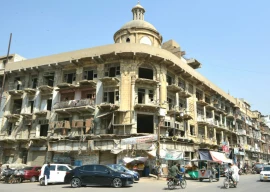The move is likely to impact households who are most likely to face increased hours of load shedding.
The cut seems to be another sign of the “pro-industry” government bowing down to wishes of industrialists. Earlier this week, the All Pakistan Textile Mills Association had threatened to go on strike unless more gas was allocated to it.
Headed by Finance Minister Ishaq Dar, the ECC of the Cabinet took the decision just ten days before the scheduled closure of canals for annual cleaning. The canal closure, scheduled from December 26 to January 31, will cause up to six hours load shedding across the country due to drop in hydro power generation. The gas cut for the power sector will exacerbate load shedding.
“The ECC decided to divert 85 MMCFD of gas presently being provided to the power sector to the industry with immediate effect”, according to a statement issued by the Ministry of Finance. It added the decision was taken to facilitate the export oriented sector to take full advantage of GSP plus facility granted to Pakistan by the European Union.
The government claimed that the decision will check unemployment and help maintain the present momentum of growth besides earning much needed foreign exchange for the country.
Irrespective of the Finance Ministry claim, the Minister of State for Commerce Khurram Dastgir said on Tuesday that at the moment Pakistan was not well positioned to take full advantage of the GSP plus status. The country was exporting only 150 products or 2.5% out of 6000, offered on zero duty.
With 85 MMCFD gas, as much as 500 megawatts electricity can be generated, according to an Independent Power Producer (IPP) official whose plant will be affected due to gas cut. The 500MW shortfall will result in one additional hour of load shedding across the country at any given time.
According to the National Power Policy of 2013 of the PML-N government, due to scarcity of gas, the domestic sector has priority followed by power, then general industries and fertiliser with the CNG sector coming at the bottom.
Prime Minister Nawaz Sharif had approved the proposal to divert gas to the industries on Monday.
Coal push
In order to mitigate the costs of generating power from furnace oil, the ECC also approved plans convert four power plants to coal. This will offset generation of 2153MW of power from furnace oil to coal. National Electric Power Regulatory Authority was directed to determine the tariff within 45 days.
The plants which will be converted to coal include Hub power company, (1,292 MW), Lalpir power plant, (362 MW) Pakgen power plant, (365 MW) and Saba power plant (134 MW).
These power plants had entered into a Memorandum of understanding with the government to convert their plants from furnace oil to coal within 24 months when the government cleared the circular debt. The federal government claimed that the conversion will result in saving of Rs60 billion per annum.
Tax restructure for new aircrafts
The ECC also decided that aircrafts acquired by airlines on lease would be charged taxes on monthly basis.
The move will be a departure from the current system of calculating tax on the total period of lease.
The move is likely to benefit the national flag carrier which was struggling to pay the tax at once.
COMMENTS (5)
Comments are moderated and generally will be posted if they are on-topic and not abusive.
For more information, please see our Comments FAQ

1722421515-0/BeFunky-collage-(19)1722421515-0-165x106.webp)






1732084432-0/Untitled-design-(63)1732084432-0-270x192.webp)








Good. Our industries need all the help they can get. Industries are the motor of any country wanting to succeed in today's world.
@ Fawad PIA is a national institution, not an individual. . People were claiming before that PIA is being drowned to benefit individual owners of other airlines. . Can Pakistan ever progress with such negative mind set.
Good decision by the government.
As usual, policies are made to benefit an individual rather than the whole system. 'Taxing airlines on monthly basis was done to benefit PIA' .
Excellent decision. Industries create job which will reduce poverty.